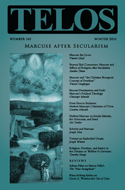Caroline Edwards’s “From Eros to Eschaton: Herbert Marcuse’s Liberation of Time” appears in Telos 165 (Winter 2013). Read the full version online at the Telos Online website, or purchase a print copy of the issue in our store.
 This article explores what Gershom Scholem has called Herbert Marcuse’s “unacknowledged ties to [his] Jewish heritage.” At the core of Marcuse’s vision of transformed, non-repressive social relations, I argue, is a struggle over time, which rests upon a distinctly Jewish approach to the twin questions of remembrance and redemption. One example of this approach is the temporal dialectic between alienated labor time and the timelessness of pleasure’s desire for eternity, which underpins Marcuse’s analysis in Eros and Civilization (1956). This dialectic rests upon Marcuse’s reading of the Freudian Eros-Todestrieb dualism, whose phylogenetic reading of patricide has been read by critics as reformulating the biblical rebellion against an authoritarian Yahweh.
This article explores what Gershom Scholem has called Herbert Marcuse’s “unacknowledged ties to [his] Jewish heritage.” At the core of Marcuse’s vision of transformed, non-repressive social relations, I argue, is a struggle over time, which rests upon a distinctly Jewish approach to the twin questions of remembrance and redemption. One example of this approach is the temporal dialectic between alienated labor time and the timelessness of pleasure’s desire for eternity, which underpins Marcuse’s analysis in Eros and Civilization (1956). This dialectic rests upon Marcuse’s reading of the Freudian Eros-Todestrieb dualism, whose phylogenetic reading of patricide has been read by critics as reformulating the biblical rebellion against an authoritarian Yahweh.
I argue that we should read Marcuse’s privileging of the Freudian Eros-Todestrieb dualism as tacitly redefining political struggle through the affirmation of a redemptive model of cyclical time, which responds to a Jewish apocalyptic-utopian tradition. I consider the ways in which Marcuse’s later writings in such texts as “Liberation from the Affluent Society” (1968), An Essay on Liberation (1969), Five Lectures (1970), and Counter-Revolution and Revolt (1972) reveal the liberation of time to be grounded in the uncovering of nature’s “erotic cathexis.” Cyclical time thus offers Marcuse an Orphic recourse with which to confront the linear time of advanced industrial capitalism. In reading Marcuse’s delinearization of time through a reformulated understanding of Judeo-Christian eschatology, I conclude, we are afforded a fuller account of the way in which time underpins Marcuse’s appeals to utopia.



